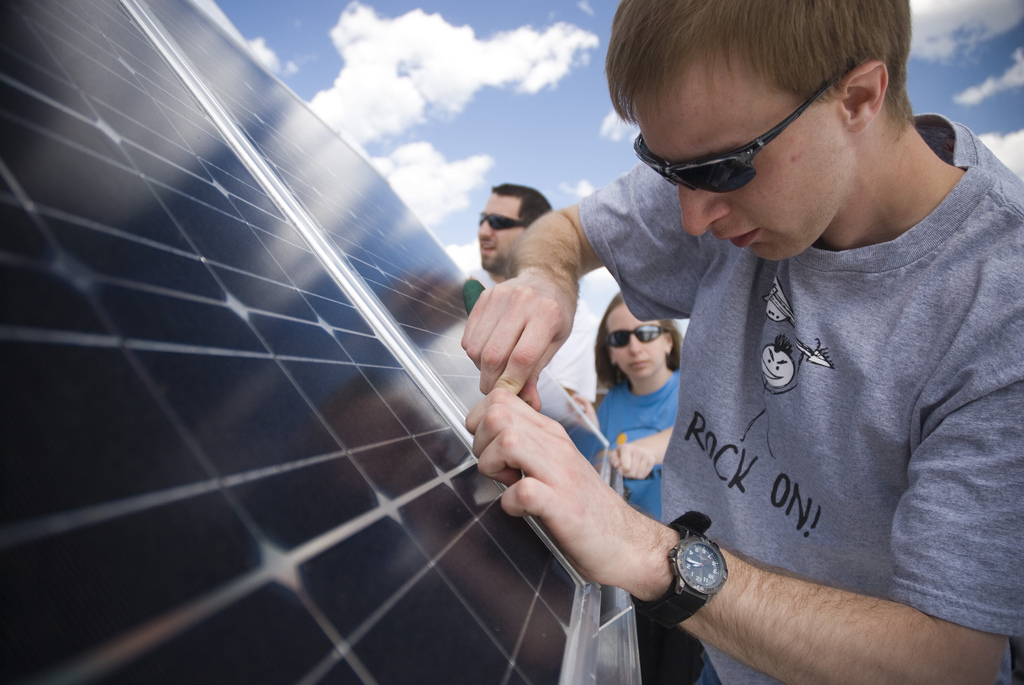Kresge Education Program support helps effort on campuses of community colleges and minority-serving institutions.
When Tim Johnston took over as director of plant services at Northeast Texas Community College in 2008, his challenge was to bring the 25-year-old campus infrastructure into the 21st century.
“I was lucky in that I gave the board of trustees a five-year plan, and they decided they wanted me to do it,” says Johnston, who has since overhauled every energy-consuming system on campus with a more efficient, sustainable alternative. “We’ve done quite a lot and we intend on doing more. If you stop, you’re backing up.”
In 2009 Second Nature, an organization that helps colleges and universities practice and teach sustainability, selected Johnston as one of its Kresge Fellows. Funded by a three-year, $1.24 million grant from The Kresge Foundation’s Education Program, the fellowship program allows college staff members to like Johnston to attend a national green building conference. Johnston’s $2,000 stipend let him attend the Greenbuild International Conference and Expo in Phoenix.

A $750,000 energy grant through the American Recovery and Reinvestment Act – funding Johnston learned about at the conference – paid for a wind turbine and solar panel system that let the building run completely off the grid and sell excess electricity back to the power company. The Elizabeth Hoggatt Whatley Ag Complex was the second “net-zero” building in Texas when it opened this year, Johnston says.
Although about half of mainstream colleges and universities are addressing sustainability, most community colleges and minority-serving institutions are not. The reasons range from the perceived daunting up-front cost of building green to a lack of local contractors with green building experience. Sometimes sustainability just isn’t a priority in the institutional culture, says Georges Dyer, vice president of programs at the Boston-based Second Nature.
Second Nature works with colleges and universities to create a culture of energy and environmental sustainability on their campuses so that, for the next generation of leaders, thinking and acting sustainably becomes second nature.
“What Second Nature does that’s so great is help colleges and universities that have fewer resources access the kind of innovations that can help them save real money, which strengthens their bottom line,” says Kresge Education Program Director Bill Moses. Reducing energy costs and overhead allows under-resourced colleges to educate more students, improve faculty pay and upgrade facilities, he says.
Absent that kind of help, there’s a risk that only the best-endowed and resourced institutions will have access to this technology and innovation, Moses says.
The same grant that sent Johnston to Phoenix also helped Second Nature establishCampusGreenBuilder.org, a first-of-its-kind Web portal that provides hundreds of links to green building-related websites, directories of experts and resources for training and funding for higher education institutions.
Other Second Nature programs spread green building know-how to local contractors and create networks and coalitions within higher education, helping institutions learn from each other and then act upon that knowledge.
A more recent one-year, $554,000 grant from Kresge helps Second Nature improve and expand the Advancing Green Building program. Plans include a revolving loan fund to support energy-saving renovations and mentoring for students interested in green careers.
“The leadership of higher education in creating a sustainable future has emerged as a driving force in recent years,” says Anthony Cortese, president of Second Nature. “This grant comes at a critical time to empower minority-serving and financially strained institutions to bring their leadership to the forefront in ways that will help the communities they serve create jobs and become healthier and more secure.”
Photo: Student Nicholas Eurich installs a solar panel at Northland College in Ashland, Wis., as part of a photovoltaic class. The college offers a distinctive environmental liberal arts curriculum and is committed to apply in practice what it teaches about developing a sustainable future. The college gets support from Kresge grantee Second Nature.
